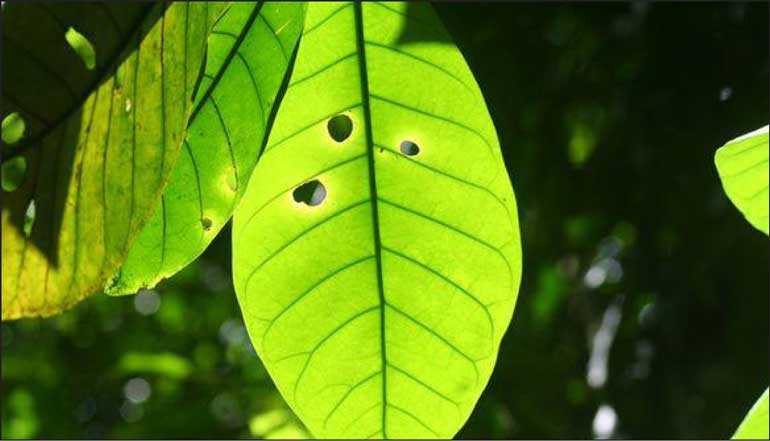Monday Feb 16, 2026
Monday Feb 16, 2026
Thursday, 4 June 2020 00:18 - - {{hitsCtrl.values.hits}}

Many excellent recommendations are appearing in the press these days about the path forward after COVID-19, such as increased focus on domestic agriculture, energy resort to renewables, re-thinking  on import substitution, re-focusing tourism on the local and regional, pro-poor policies for the daily wage earners etc. What is missing is the debate on how to take forward the gifts provided by nature as a result of the months of lockdown. Around the globe, the reduction in air pollution, clear skies, rivers running clear and sightings of rare animals and unusual flowering have been welcomed as the “green harvest”. But in Sri Lanka, normally an argumentative people, perhaps “green” has unhappy political connotations, or cynicism has set in, such that many believe that eventually things will return to the previous levels of pollution. Is this why there is no “green” movement in this country?
on import substitution, re-focusing tourism on the local and regional, pro-poor policies for the daily wage earners etc. What is missing is the debate on how to take forward the gifts provided by nature as a result of the months of lockdown. Around the globe, the reduction in air pollution, clear skies, rivers running clear and sightings of rare animals and unusual flowering have been welcomed as the “green harvest”. But in Sri Lanka, normally an argumentative people, perhaps “green” has unhappy political connotations, or cynicism has set in, such that many believe that eventually things will return to the previous levels of pollution. Is this why there is no “green” movement in this country?
Each of the areas identified for re-starting the economy are long bedevilled by conflict. Having a professional President for the first time may be the final opportunity for this country to strike a sound balance between conservation and development imperatives. This article argues that as a mainly Buddhist country, protection of the environment and compassion of animals is as important to the philosophy as protection of heritage built sites and meeting the basic needs of the people. To take just one example, the Government emphasis on food security is understandable but huge problems loom ahead if farmers are to be encouraged to encroach into wildlife and forest reservations. Remember the TV coverage months ago of huge old trees in Somawathiya being burnt at the roots and left to fall? This week there were reports of the threats to the same Flood Plains National Park in the Polonnaruwa district surrounded by the Kaudulla, Angamedilla and Somawathiya National Parks and the Triconamadu Nature Reserve by encroachment, unauthorised farming and illegal activities leading to the destruction of traditional villus and habitat within the National Park. Ideally, the Mahaweli and Wildlife officials should be able to work together to demarcate boundaries as gazetted and educate the farmers, but for years they have been unable to do so because of political interference.
Increased digitalisation during the COVID-19 crisis has permitted more exchanges of images and data on the unique gains in the natural world as a result of the lockdowns. There was even speculation that the largest ozone hole over the Arctic had closed although some scientists disagreed on its cause. Before COVID-19, economists chose to believe that globalisation was unstoppable, an ever increasing movement of peoples and goods relying on global supply chains. They chose to ignore the warning signs of extreme weather events, harbinger of global climate change and the onset of de-globalisation witnessed in rising inequalities, resistance to free movement leading to border controls, and calls to reverse outsourcing in favour of national self-reliance. Protecting the environmental gains that nature has offered us in the lockdowns is the best “bright” idea in the emerging new Normal.
Ideas have to be pursued at the national level because at this time of crisis, the international system appears paralysed with the UN Secretary General himself lamenting the lack of a coordinated global approach. Now that the pandemic recovery is under way, the very existence of WHO is under threat, a prey to the US-China conflict.
While the collapsing global consensus has hampered collective decision making, the heart of the problem, the source of the virus, lies in the unethical treatment of wild animals. It is no secret that earlier epidemics from Ebola to SARS had their source in virus transmission from wild animals to humans, yet even countries as powerful as China had not succeeded up to now in defeating established cultural norms and the uncontrolled commercial exploitation of wild animals. Experts point to the breeding of civet cats and raccoon dogs for their fur as being the likely source of the COVID-19 virus. Recently, China has at last moved to ban these live markets and wild animal farms which have been criticised for so long for their cruelty and lack of hygiene. However there is still the unresolved problem of the lucrative traditional medicine market in China which may lead to the illegal wildlife trade now going underground. Increased poaching of rare species like the rhino is already being reported from Africa. Alarm bells rang in Sri Lanka when a leopard was found recently killed with its teeth and claws removed. Recently a Chinese visitor was detected at customs taking out indigenous scorpions in his suitcase, and European visitors have been caught collecting plant and insect specimens from Horton Plains and Sinharaja.
The Government should reinvigorate the demoralised Wild Life Department to do active surveillance on the ground and meaningful protection against poaching of wild life. Finally the Cabinet has approved the long delayed Animal Welfare bill against cruelty to animals but there is a long way to go before it become law. Some months ago the Wildlife department had gone on strike and it was rumoured that the animals in Government charge, from Pinnawela to Dehiwala and Ridiyagama had not been fed for three days – what is their plight now that no revenue is coming in from visitors?
The most evident positive gain on the environment in Sri Lanka as a consequence of these months of “brutal” lockdown is that for the first time the air quality in Colombo is classified as “good” by international standards. We have all experienced the reduction in dust inside houses and the clearing of the overhead skies where stars are visible at night. With social distancing and work from home rules, this is the best time to change the old strategy of building more and more roads to accommodate more and more vehicles. Now is the time to build on traffic management after identifying the optimum number of vehicles which our present road network could take. On the way to Kahatuduwa from Colombo recently, I counted at least 4 car dealerships with huge stocks of parked new or used vehicles begging for rational draw- down. The Government has already begun this task by applying import controls on new vehicles and regulating vehicle use by the last digit on the ID card, which should be taken forward using alternate plate numbers like elsewhere, together with simplification of procedures for exceptions through a simple email application. Reducing private vehicle use needs to be supplemented by more public transport and it was good to hear the President urging the SLTB to rise to the challenge using local ingenuity and skills to refit more public buses and develop clean mass transport domestically.
Should we not move our national growth strategy from constructing more roads to protecting the water resources and providing safe drinking water and sanitation for the entire population? The Kelani River which is crucial to the heavily populated Western Province, has registered a significant improvement in water quality according to the CEA, due to the lack of industrial activity during the past weeks of lockdown. This improvement will most likely be reflected in all of the major rivers in the island. Nature’s restoration work should be protected by the long awaited political decision to demarcate a buffer zone on either side of all the major rivers of the island so as to protect these waters from pollution. Water security also implies protecting the watershed, cleaning the irrigation tanks, preserving traditional systems and making rainwater harvesting compulsory. Rainwater harvesting is the best solution for the dry zone periodically stricken by drought, where locally built storage tanks can provide drinking water for a family for up to eight months, while more domestic storage will also reduce the run-off during monsoons.
With global tourism expecting a 50% to 75% downturn, a moratorium should be placed on new hotel construction and preparation instead for much smaller numbers of arrivals under the new rules of social distancing and hygiene. Before the present crisis, new hotel construction had been proliferating at such a pace that many had complained they would eat into the business of the existing hotels and stress the wildlife and nature resources. In re-starting the economy, can we encourage tourism authorities to contribute to the protection of the environment and to care for the wildlife that they advertise so freely?
Going into the new normal, the Sri Lankan President has placed his trust in retired military commanders to run key Government ministries and organisations covering the ports, customs, health and even Mahaweli. In a time of humanitarian emergency as at present, it has been traditional for the military to take the lead. Now for the first time they are being asked to deliver on important national projects for re-starting the economy where the politicians and the bureaucrats have failed for decades. A key question is whether this can be done while safeguarding our national heritage and nature’s gift of recovery? Although some have criticised the recent high profile visit by Defence officials to an important archaeological site in the Eastern Province, it also represents a welcome signal that the Government is willing to extend its protection to national heritage treasures like Muhudu Maha Vihara and Digavapi. Establishing a Navy post will help check the perennial smuggling of people, drugs, detonators and explosives along the open coast.